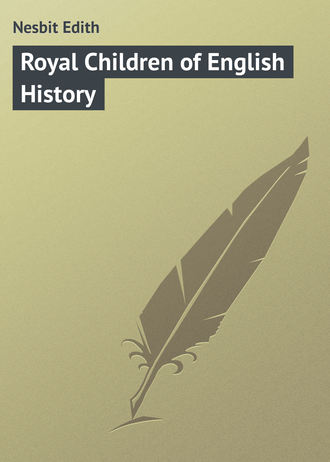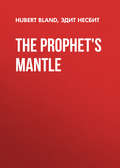
Эдит Несбит
Royal Children of English History
Prince Arthur
a. d. 1066
THE Danes never succeeded in conquering England and in making it their own, though many of them settled in England and married English wives. But some relations of the Danes, called the Normans, were bolder and stronger and more fortunate. And William, who was called the Conqueror, became King of England, and left his son to rule after him. And when four Norman Kings had reigned in England, the Count of Anjou was made the English King, because his mother was the heiress of the English crown.
His great-grandfather, Ingeger, the first Count of Anjou, must have been a very brave man. When he was quite a boy he was page to his godmother, who was a great lady. It was the custom then for boys of noble family to serve noble ladies as pages.
One morning this lady's husband was found dead in his bed, and the poor lady was accused by a nobleman, named Gontran, of murdering him. Gontran said he was quite sure of her guilt, and that he was ready to stake his life on it, that is to say, he offered to fight anyone who should say that the lady was innocent. This seems a curious way of finding out a person's innocence or guilt, but it was the custom of the times.
The poor lady could find no one who believed in her enough to risk his life, and she began to despair, when suddenly her boy-page rushed forward and begged that, though he was not yet a knight, and so had really no right to fight, yet that he might be allowed to do combat in her defence. "The whole Court were spectators. The Duke Charles was on his throne, and the accused widow in a litter curtained with black. Prayers were offered that God would aid the right. The trumpets sounded, and the champions rode in full career against each other. At the first onset Gontran's lance pierced his adversary's shield so that he could not disengage it, and Ingeger was thus enabled to close with him, hurl him to the ground, and despatch him with a dagger. Then, while the lists rang with applause, the brave boy rushed up to his godmother and threw himself into her arms in a transport of joy."
When William conquered England he became King of England and still owned his own possessions in Normandy, and the Count of Anjou, when he became King, still held the lands he had held as Count, so that the Kings of England held a great part of France as well as England. The Counts of Anjou used to wear a sprig of broom, or planta genista, in their helmets, and from this they were called the Plantagenet Kings.
The first of them was brave and clever, and the second was brave, but the third, John, was mean and cruel and cowardly, and had really no right to the throne at all. His nephew, Prince Arthur of Brittany, ought to have been King, because he was the son of John's elder brother. But John wanted the kingdom for himself, and though the King of France tried to help Arthur to get his rights, John would not give up the crown he had stolen. He managed to take Prince Arthur prisoner, and then pretended to be very fond of him. "All this quarrel has been a mistake," he said; "come with me and I will give you a kingdom."
So Prince Arthur went with him, and in the dark night, as they passed along by the river, the wicked King stabbed the young Prince with his own hand, and pushed him into the swift-flowing water. "There," he cried, "that is the kingdom I promised you."
And the poor young Prince sank into the dark flood, never to rise again.
Shakespeare tells another story of Prince Arthur's death, which you will read for yourselves one day; and this is the story: —
After King John had taken the young Prince prisoner, he shut him up in the Castle of Northampton, and ordered Hubert de Burgh, the Governor of the Castle, to put poor Arthur's eyes out, because he thought that no one would want a blind boy to be King of England. So Hubert went into the room where the little Prince was shut up.
"Good morning," said the Prince. "You are sad, Hubert."
"Indeed, I have been merrier," said Hubert, who, though he did not like to disobey the King, was yet miserable at the wicked deed he had been asked to do.
"Nobody," said Arthur, "should be sad but I. If I were out of prison and kept sheep I should be as merry as the day is long. And so I would be here but for my uncle. He is afraid of me and I of him. Is it my fault that I was Geoffrey's son? Indeed it is not, and I would to heaven I were your son, so you would love me, Hubert."
"If I talk to him," said Hubert to himself, "I shall never have the courage to do this wicked deed."
"Are you ill, Hubert?" Arthur went on. "You look pale to-day. If you were ill I would sit all night and watch you, for I believe I love you more than you do me."
Hubert dared not listen. He felt he must do the King's wicked will, so he pulled out the paper on which the King had written his cruel order, and showed it to the young Prince. Arthur read it calmly and then turned to Hubert.
"So you are to put out my eyes with hot irons?"
"Young boy, I must," said Hubert.
"And you will?" asked Arthur.
And Hubert answered, "And I will."
"Have you the heart?" cried Arthur. "Do you remember when your head ached how I tied it up with my own handkerchief, and sat up with you the whole night holding your hand and doing everything I could for you! Many a poor man's son would have lain still and never have spoke a loving word to you; but you, at your sick service, had a prince. Will you put out my eyes – those eyes that never did, nor never shall, so much as frown on you?"
"I have sworn to do it," said Hubert. He called two men, who brought in the fire and the hot irons, and the cord to bind the little Prince.
"Give me the irons," said Hubert, "and bind him here."
"For heaven's sake, Hubert, let me not be bound," cried Arthur. "I will not struggle – I will stand stone still. Nay, hear me, Hubert, drive these men away and I will sit as quiet as a lamb, and I will forgive you whatever torment you may put me to."
And Hubert was moved by his pleading, and told the men to go; and as they went they said – "We are glad to have no part in such a wicked deed as this."
Then Arthur flung his arms round Hubert and implored him to spare his eyes, and at last Hubert consented, for all the time his heart had been sick at the cruel deed he had promised to do. Then he took Prince Arthur away and hid him, and told the King he was dead.
But King John's lords were so angry when they heard that Arthur was dead, and John seemed so sorry for having given the order to Hubert, that Hubert thought it best to tell him that Arthur had not been killed at all, but was still alive and safe. John was now so terrified at the anger of his lords on Arthur's account that Arthur might from that time have been safe from him. But the poor boy was so frightened by what he had gone through that he made up his mind to risk his life in trying to escape. So he decided to leap down from the top of the tower as his only means of escape.
Then he thought he could get away in disguise without being recognised.
"The wall is high, and yet will I leap down," he said. "Good ground, be pitiful and hurt me not."
So he leaped, but the tower was high, and the fall killed him. And before he died, he murmured – "Heaven take my soul and England keep my bones."
That is the story as Shakespeare gives it.
Almost everyone in England hated King John, even before this dreadful affair of Prince Arthur's death. The King of France took Normandy away from him, and his own people would not help him to fight for it.
He was very cruel and revengeful, and often put people in prison or killed them without giving any reason for it, or having them properly tried. So the great nobles of England joined together and said that they would not let John be King any longer in England unless he would give them a written promise to behave better in future. At first he laughed at the idea, and said he should do as he chose, and that he would fight the lords and keep them in their proper place. But he had to give in when he found that only seven of the lords of England were on his side and all the rest against him. So then he asked the barons and the bishops to meet him at Runnymede and there he put his big seal to a writing, promising what they wished. He did not sign his name to it, but you can see that very parchment sealed in the British Museum with the King's big seal to it.
Magna Charta
a. d. 1215
But though he fixed his seal to the paper he did not keep the promises that were in it, and the barons grew so angry that they asked the King of France to help them to fight John, and to turn him out.
John ran away when he heard that the French were coming. He left his friends to fight his battles, and went off, wrecking the castles of the barons who had asked the French Prince to come over, and who were now with him. Then someone told the barons that the French Prince was determined to cut off all their heads as soon as he had got England for his own. So they saw how foolish they had been to ask him to come and help them. John was in Lincolnshire, and was coming across the sands at the Wash, but the tide suddenly came in and swept away his crown, his treasure, his food, and everything was lost in the sea. King John was very miserable at losing all his treasures, and he tried to drown his sorrows by drinking a lot of beer and eating much more than was good for him. This brought on a fever, and he died miserably, with no one at all to be sorry for him.
a. d. 1216
He was and is the best-hated of all our English kings.
There was much danger in travelling in those days, for robbers used to hide in the woods and lonely places, and to attack and rob travellers. Many of the nobles themselves who were in attendance on the King, being often unable to get their proper pay, either belonged to these robber bands or secretly helped them, and shared with them the plunder they took from those they robbed. The best known of these robbers was the famous Robin Hood, who lived in the time of King Richard and King John. He is supposed to have been a nobleman, and to have had his hiding place in Sherwood Forest, and he is said to have been kind and merciful to the poor, and to have helped them out of the money and good things he stole from the rich. Many songs about him have come down to us. The poor suffered in those old days many and great hardships at the hands of the nobles of England, who indeed robbed and oppressed them very cruelly. So they were ready enough to sing the praises of one who stole only from the rich and who gave to the poor.







